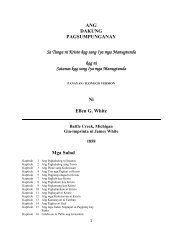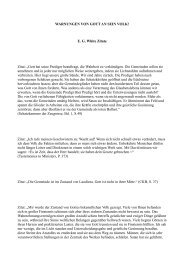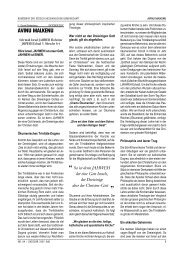Die Heilige Schrift - deutsche Version - nur ... - Der groÃe Konflikt
Die Heilige Schrift - deutsche Version - nur ... - Der groÃe Konflikt
Die Heilige Schrift - deutsche Version - nur ... - Der groÃe Konflikt
- Keine Tags gefunden...
Sie wollen auch ein ePaper? Erhöhen Sie die Reichweite Ihrer Titel.
YUMPU macht aus Druck-PDFs automatisch weboptimierte ePaper, die Google liebt.
10 . DISPUTE RESOLUTION IN CHINA: PATTERNS, CAUSES, AND PROGNOSISthroughout China. Cao Lijun’s policy brief focuses onCIETAC, which has been by far the most important interms of foreign investors.CIETAC is one of the busiest arbitration centres inthe world. While overall arbitration is insignificantrelative to the number of disputes resolved throughmediation or litigation, CIETAC’s caseload has risendramatically in just twenty years from a mere thirtysevencases in 1985 to over 900 cases per year today.By way of comparison, in 2005 there were 580American Arbitration Association arbitrations, and 521International Chamber of Commerce (ICC) arbitrations.CIETAC has continually responded to criticisms andmarket demands by amending its rules — six timessince 1988, the most recent in 2005. The revisionsreflect two general trends: first, convergence withinternational best practices; second, more autonomyand flexibility for the parties.Despite the recent rule changes, investors still findfault with CIETAC on several fronts. The Ministry ofJustice has imposed limitations on the role of foreignlawyers, who are not allowed to interpret PRC lawbut must rather rely on PRC co-counsel. In addition,the pay for arbitrators is low by internationalstandards, thus limiting the number of foreignerswilling to serve in the crucial post of chief arbitrator.And ad hoc arbitration is not allowed.than in commercial cases; (ii) a trend towarddejudicialization (in contrast to the judicialization ofcommercial disputes), as the government has steeredsocio-economic disputes away from the courtstoward other mechanisms such as administrativereconsideration, mediation, arbitration, publichearings, and the political process more generally;(iii) a sharp rise in mass-plaintiff suits; (iv) adramatic rise in letters, petitions, and social protestsin response to the inability of the courts and othermechanisms to address adequately citizen demandsand expectations; (v) a reallocation of resourcestoward the least well-off members of society as partof a government effort to contain social instabilityand create a harmonious society, combined with asimultaneous increase in targeted repression ofpotential sources of instability, including politicaldissidents, NGOs, and activist lawyers.Pension and other welfare claimsMany reforms have sought to revamp the pensionsystem, the most significant of which is theestablishment of social security funds to which both theemployers and the employees are required to contributea part (Hurst and O’Brien 2002). Nevertheless, SOEreform and the transition to a market economy have ledto many disputes over pension payments and otherwelfare benefits, including unemployment insurance, jobrelocation and training expenses, worker's compensationbenefits, and medical care.There has also been criticism of CIETAC scrutiny ofawards, although other arbitral bodies, includingthe ICC and Hong Kong Arbitration Commission, alsoscrutinize awards. Moreover, ICC scrutiny appears to bemuch more frequent and invasive than CIETAC scrutiny.Socio-economic disputesSocio-economic cases involving pension andother welfare claims, labour disputes, land takings,and environmental issues present problems fordeveloping countries because institutions are weakand the state lacks the financial resources toaddress what are, in essence, economic issues.Dispute resolution of socio-economic cases has beencharacterized by: (i) notably less effective resolutionMany SOEs have gone bankrupt and ceased toexist or are insolvent. Others have been sold off orrestructured. The new buyer or restructured company isunwilling or unable to assume the welfare obligations.Some enterprises are unwilling or unable to contributetheir share to the social security funds for employees,or to provide retraining, unemployment, or socialsecurity payments for laid-off employees. In somecases, local government officials unilaterally decreasethe amount of benefits. Meanwhile, some socialsecurity fund managers have refused to distributethe pensions or misappropriated funds. 77. As widely reported, one billion yuan of the social security fundsin Guangzhou has been misappropriated. See e.g., the People’sCourt Daily, 3 April 2007.
















